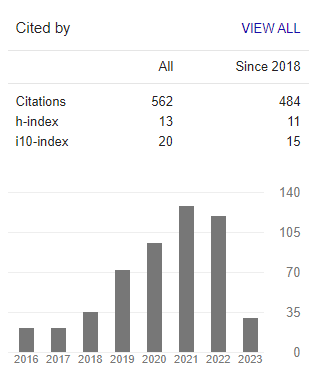BATTLE FOR THE COVID-19 GLOBAL NARRATIVES: The Tanzanian Online Discourse on Millard Ayo's Instagram
Abstract
Amidst COVID19, Beijing was in diplomatic tension with its ‘all-weather friend’ Africa for allegedly targeting Africans in efforts to combat imported cases. As it is in the battle for covid-19 global narrative, U.S. and China faced off. The U.S. took a “condemning China approach,” while China applied “blaming the U.S. of sowing discord on China-Africa friendship.” This study purposely and comparatively picks the two narratives with 1253 pro-U.S. and 683 pro-China total comments as posted on a Tanzanian blogger, Millard Ayo’s Instagram page of 7.2 million followers. It randomly selected 514 (41%) and 276 (40.4%) comments from the two narratives. Through tracking online discourse, coding, and analyzing dominant thematic issues, findings reveal that few netizens asserted China’s story on the incidents, with a significant number supporting retaliation against China. Although the U.S. “condemnation narrative” received high approval, the majority of comments also questioned its moral authority. Interestingly a considerable number of words branded both U.S. and China ‘imperialists’ racing for Africa’s natural resources and wealth. Overall, this research reveals the prevalence of flaws in the Sino-Africa relationship and that the reported discriminations have further worsened the ties, at least for ordinary people.
To cite this article (7th APA style):
Basebya, K. A. (2020). Battle for the Covid-19 Global Narratives: The Tanzanian Online Discourse on Millard Ayo's Instagram. Journal Communication Spectrum: Capturing New Perspectives in Communication, 10(2), 94-104. http://dx.doi.org/10.36782/jcs.v10i2.2080
Keywords
References
Bandurski D. (2015) “How China’s Government Controls the News: A primer https://foreignpolicy.com/2015/07/21/china-media-xi-jinping-crackdown-newspaper/
Chinese Academy of Social Science-CASS (2020) “Focus on Improving the Ability to Respond to External Attacks on China” http://www.cssn.cn/zk/wjyya/202004/t20200424_5118468.shtml?COLLCC=347016890&
Dunn M. (2005) “Media and Narrative: Television News as narrative” - Cambridge University Press, PP 142 – 252
Fulton H. (2005) “Narrative and Media: The power of narrative” - Cambridge University Press, pp1-7
http://www.philol.msu.ru/~discours/images/stories/speckurs/Narrative_and_media.pdf
Fulton H. (2005) “Narrative and Media: Analysing the Discourse of News” – Cambridge University Press, PP 245 - 267 http://www.philol.msu.ru/~discours/images/stories/speckurs/Narrative_and_media.pdf
Insikt Group (2019) “Beyond Hybrid War: How China Exploits Social Media to Sway American Opinion” - Recorded Future Project, Cyber Threat Analysis https://www.recordedfuture.com/china-social-media-operations/
John F (2020) “Information Welfare: Fighting for Narrative Dominance in Time of Crisis” Encyclopedia Geopolitica https://encyclopediageopolitica.com/2020/06/07/information-welfare-fighting-for-narrative-dominance-in-a-time-of-crisis/amp/
Lalleguy H. & Marshall J. (2019) “The Incentives and Effects of Independent and Government-Controlled Media in the Developing World” www.scholar.harvard.edu
Lovell S.J. (2002) “Media Power and Information Control: A Study of Police Organizations and Media Relations” – Rutgers University, School of Criminal Justice www.ncjrs.gov
Mazzar M.J. et al (2018) “Understanding the Emerging Era of International Competition: Theoretical and Historical Perspectives” www.rand.org/t/RR2726
Owen D. (2018) “The New Media’s Role in Politics” Georgetown University, Washington DC, USA
National Security Strategy of the United States (2017) “pp 45-53 http://www.oxfordhandbooks.com/view/10.1093/oxfordhb/9780199793471.001.0001/0xfordhb-9780199793471-e-016
Rosenberger L. (2020) “China’s Coronavirus Information Offensive” – Foreign Affairs Magazine www.foreignaffairs.com/articles/China/2020-04-22/chinas-coronavirus-information-offensive?amp&_twitter_impressive=true
Shannon A. et al (2011) “Where’s is the learning? An analysis of Media Stories of Digital Media Learning” – Frameworks Institute PP 3-7
Refbacks
- There are currently no refbacks.

This work is licensed under a Creative Commons Attribution 3.0 License.
Indexed by:
Archived in:
Listed in:
INTERNATIONAL ASSOCIATION FOR MEDIA AND COMMUNICATION RESEARCH

















